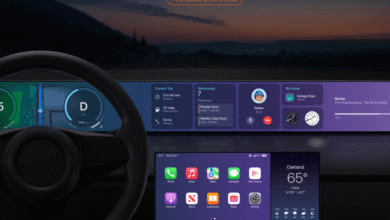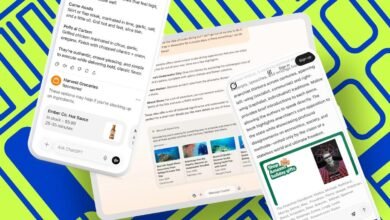AI Showdown 2025: Is Google’s Gemini Finally Eclipsing ChatGPT?

▼ Summary
– The AI landscape in 2025 is highly competitive, focusing on user trust and seamless integration into daily life, with Google and OpenAI as key players.
– OpenAI’s ChatGPT remains influential for its conversational abilities, widely used by students, writers, and developers for various tasks.
– Google’s Gemini is deeply integrated into its ecosystem, enhancing services like Search, Gmail, Sheets, and Android with real-time data and workflow integration.
– AI’s impact is measured by practical applications in daily work, with ChatGPT excelling in creative tasks and Gemini in context-aware, integrated tasks.
– Trust remains a core challenge, with companies focusing on responsible deployment to avoid issues like misinformation and biases, crucial for long-term success.
Remember the shockwave ChatGPT sent through the tech world just a couple of years ago? It felt like artificial intelligence suddenly learned to talk, moving from lab curiosity to a tool that millions used daily. Fast forward to April 2025, and the AI arena looks vastly different. The initial frenzy has settled into a high-stakes competition, not just for the smartest algorithm, but for something far more valuable: user trust and seamless integration into our lives. Google, initially seen as playing catch-up, is now firmly in the ring with its Gemini ecosystem, challenging the conversational king.
The Titans: Where They Stand Now
OpenAI’s ChatGPT, likely running on iterations well beyond GPT-4 by now, still holds significant sway. Its strength remains its conversational ability, making complex tasks feel accessible through simple prompts. It became the benchmark, the name synonymous with generative AI for the public. Students quickly adopted it for research assistance, writers for drafting, and developers for code snippets. As one marketing manager in London put it, “ChatGPT broke the ice. It made AI feel less like a complex machine and more like a capable assistant.“
However, Google hasn’t been idle. Sundar Pichai’s initial acknowledgment of ChatGPT’s impact wasn’t just talk; it signaled a strategic refocus. Today, Gemini isn’t just a standalone competitor; it’s deeply woven into Google’s fabric. You find it enhancing Search results with summarized answers, drafting emails in Gmail, organizing data in Sheets, powering features on Android phones, and offering sophisticated tools via Google Cloud. Gemini’s key advantage lies in its access to Google’s real-time information graph and its native integration across platforms many already use. It aims not just to chat, but to do – embedded directly within existing workflows.
Beyond Chat: Where AI Lives and Works
The real measure of AI’s impact isn’t abstract benchmarks, but how it’s changing daily work. The landscape in 2025 shows a diversification of use cases. ChatGPT’s strength lies in generating creative text formats and nuanced conversations, whereas Gemini often excels when context and seamless integration are key.
Consider these scenarios:
- A software developer in Austin might use ChatGPT to brainstorm approaches to a tricky coding problem but rely on Gemini integrated into their development environment (via Google Cloud tools) for real-time code completion and debugging informed by vast code repositories.
- A financial analyst in Singapore might use a specialized AI model for market predictions but turn to Gemini within Google Sheets to instantly analyze and visualize the resulting data sets.
- A freelance journalist researching a complex topic might use ChatGPT to explore different angles but leverage Google Search, enhanced by Gemini, for finding and summarizing the latest, verified information.
Although the initial appeal of ChatGPT’s human-like interaction persists, the user conversation has decisively shifted. Users now increasingly value reliability, accuracy, and how easily an AI tool fits into their existing digital lives. “It’s less about ‘does it sound human?’ and more about ‘does it reliably help me get things done without introducing errors or wasting my time?‘” observes a project manager from Sydney.
The Trust Factor: Still the Core Challenge
This brings us back to trust. The early fascination with AI’s capabilities has matured into a more critical assessment. Issues like AI “hallucinations” (confidently stating incorrect information), inherent biases learned from training data, and the potential for misuse in creating deepfakes or spreading misinformation are now front-and-center concerns.
Google, with its long history managing vast amounts of information (and facing scrutiny over data privacy), approaches this integration challenge cautiously. OpenAI, pushing boundaries rapidly, constantly works to refine safety protocols and model alignment. Both, along with other significant players like Anthropic (with its focus on AI safety via Claude) and Meta (integrating AI into social platforms), understand that long-term success hinges on responsible deployment. Public perception, as Meta’s Yann LeCun rightly pointed out years ago, remains paramount. A single major misstep in terms of bias or misinformation can significantly erode hard-won user confidence.
The Road Ahead: Integration, Utility, and Ethics
Pichai’s earlier statement that 2025 would be critical seems prescient. We are now in a phase where AI is becoming deeply embedded infrastructure. The battle isn’t just Google vs. OpenAI; it’s a broader push to make AI practically useful and ethically sound across countless applications.
Google’s ecosystem gives Gemini immense reach, yet OpenAI’s agility and focused innovation continue to propel the field forward. The winner won’t be declared based on technical specifications alone. It will be the platform, or ecosystem of platforms, that users find most reliable, useful, and trustworthy for their specific needs. As Stanford’s Fei-Fei Li has consistently argued, aligning technological progress with genuine human benefit is the defining challenge.
The AI revolution continues, but its character has changed. It’s less about the novelty of conversation and more about the substance of integration and the foundation of trust. The companies that master this blend of capability, reliability, and responsibility will truly shape how we live and work alongside artificial intelligence in the years to come.




